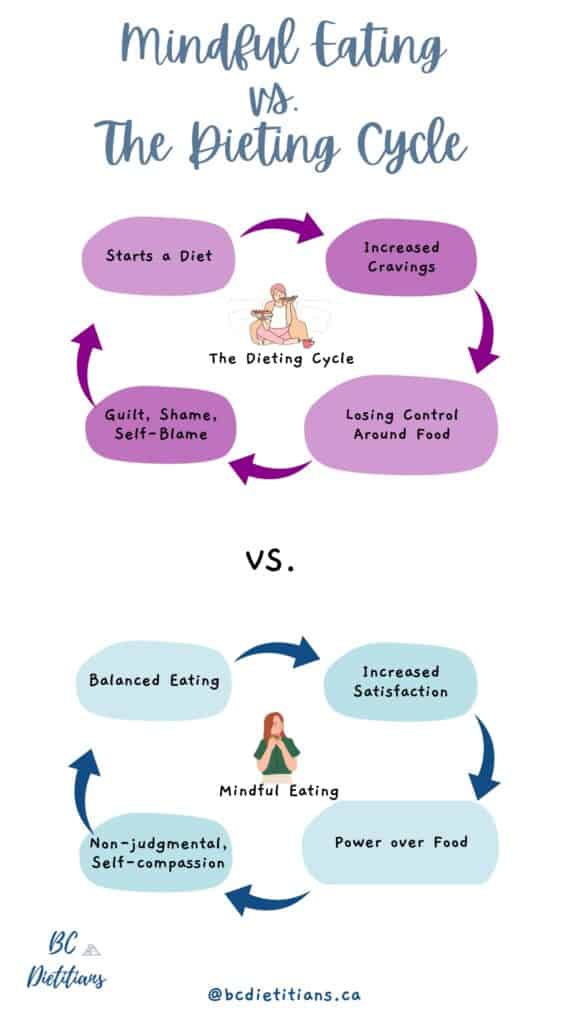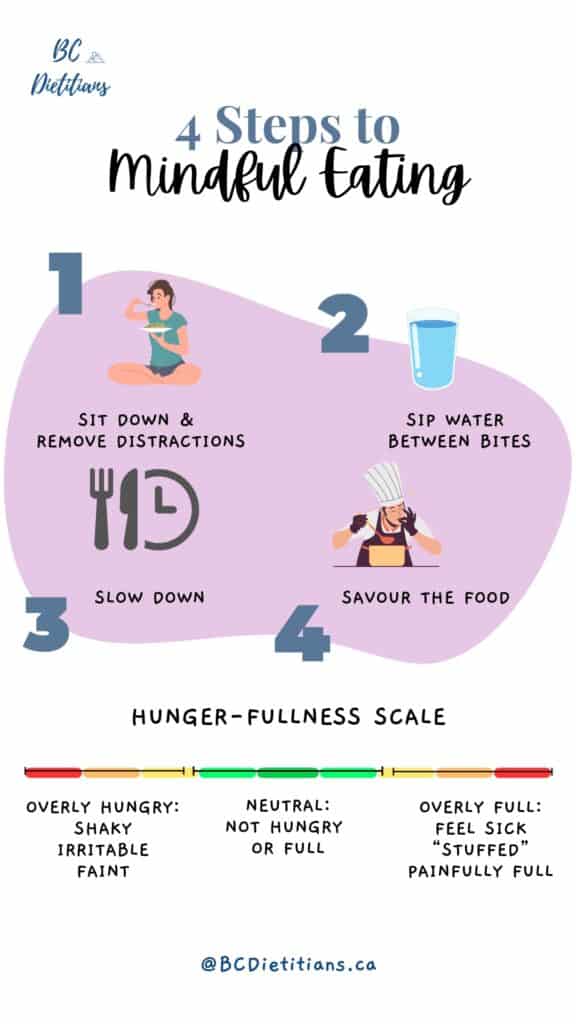Many of our clients have tried dieting at some point as a solution to lose weight, only to feel frustrated when the weight returns – sometimes even with extra pounds.
When you regain weight, you are regaining fat tissues which may lead to further health problems.
Studies show that time and time again diets don’t work long-term, even when we first see success with weight loss, you will ultimately experience your weight loss plateau by around 12 months. Dieting often lead to a cycle of weight loss and gain, commonly known as “yo-yo dieting”.
This is because dieting triggers the body’s natural appetite feedback system to increase hunger and reduce energy expenditure, making it harder to maintain weight loss over time.
Emotional eating, stress, and stress-induced hormones like cortisol are also significant barriers to weight loss. Plus, hormonal changes in women may influence hunger and appetite, making it even more challenging to control eating habits.
The key isn’t more dieting and restriction – it’s making sustainable lifestyle changes – changes that you can maintain and enjoy for the rest of your life.
Mindful eating is an evidence-based approach that encourages eating with awareness and without judgment. Mindful eating involves being aware of your natural hunger and fullness cues and has been associated with healthier food choices, weight loss, and improved psychological well-being.
Mindful eating is all about finding balance, not perfection, and prioritizing your overall well-being. By focusing on a food freedom mindset, you can create a lasting, positive relationship with food while achieving your weight loss goals.
Why Diets Don’t Work—Especially for Women Over 35
Our metabolism naturally slows down as we get older due to factors such as a decrease in physical activity and muscle mass.
Women, especially those over 35-40 years old, also experience hormonal changes through life stages including childbirth, perimenopause and/or menopause, that can impact fat storage, energy levels, and appetite regulation.
For example, a drop in both estrogen and progesterone that typically happens during menopause can slow metabolism. These factors make it harder to lose weight, even if you’re eating the same way you did when you were younger.
Restrictive diets often promise fast weight loss, but they often come at a cost: intense cravings, increased food noise, stress around food, emotional eating and further decreasing your metabolism.
Dieting creates a sense of deprivation mentally and physiologically, and once you can no longer sustain those restrictions, you may feel like you’ve failed and give up on your diet altogether. This reinforces feelings of guilt, leading to a “restart” of another diet, and the never-ending cycle unfortunately repeats itself.
This diet-binge cycle is very frustrating without any long-term results. Embracing a non-diet approach to weight loss means breaking free from harmful patterns, and fostering healthier habits.

Finding the Right Support
Working with a registered dietitian for weight loss can make all the difference.
Dietitians are trained to cut through all the fad diet myths and provide a personalized nutrition plan for sustainable weight loss. Research consistently shows that people who work with a dietitian are more likely to experience long-term success with weight management.
As a dietitian, I have helped many of my clients build a healthier relationship with food. I teach my clients permission to eat without guilt while reaching their goals at the same time.
I can help you understand your food choices, eliminate unnecessary restrictions, and focus on balanced, nourishing meals. I will empower you with practical tools to break free from the dieting cycle, food rules, guilt, and enjoy food without obsessing over it.
Sustainable weight loss isn’t about perfection – it’s about balance.
This flexible mindset means you’re more likely to stick with it for the long haul, as the changes are realistic and tailored to your goals and lifestyle.
My signature program, the mindful eating method program provides the steps to food freedom, valuable accountability and support from a registered dietitian to walk alongside your journey.

Melanie Chapple, RD
How to Regain Control Over Emotional Eating and Sugar Cravings
Emotional eating and sugar cravings often stems from stress, sadness, anxiety, and even boredom. People consume more food and typically sweet foods in response to negative emotions. Eating to soothe feelings provide temporary relief but doesn’t address the underlying emotional issues.
Emotional eating and sugar cravings can lead to an increase in overall caloric intake.
High level of stress triggers the hormone cortisol, which increases cravings for high fat and sugary foods. When we’re stressed, bored, or distracted, we often eat mindlessly as well, not paying attention to how much we’re eating and ignoring our natural hunger and fullness signals.
Over time, emotional eating can lead to unhealthy eating patterns and unintentional weight gain.
Small, consistent changes can improve eating habits. These include eating without distractions (no TV, no phones), slowing down your eating pace, and paying attention to your hunger and fullness cues.
Shifting away from the guilt and shame of eating can help free you from the cycle of food addiction and diet culture.
The Mindful Eating Method program is designed to help you make empowered eating choices with self-awareness, flexible mindset, and whole person (body, mind and spirit) approach…so you can achieve sustainable weight loss without giving up chocolate.
The Power of Mindful Eating
Mindful eating involves tuning into your body’s natural hunger and fullness cues.
This means eating when you’re hungry and stopping when you’re comfortably full. By slowing down and paying attention to how your body feels, you can make more conscious food decisions and prevent overeating.
People who practice mindful eating are more likely to recognize hunger and fullness cues and make healthier food choices, leading to healthier weights. Learn how you can achieve this with our Mindful Eating Method Program.
To tune in with your hunger-fullness cues, you can start by practicing the 4 S’s of mindful eating:
- Sit down and remove distractions: Eating at a table with no distractions helps you stay present with your meal.
- Slow down the pace of eating: Put your fork down between bites and take the time to chew.
- Sip water between bites: Drinking water helps regulate hunger and allows you to slow down.
- Savor the taste and texture of your food: Pay attention to the flavors and textures of your food. This makes eating a more satisfying and fulfilling experience.
Eating slowly and mindfully can reduce the tendency to overeat. Mindful eating isn’t about restriction or perfection – it’s about finding joy in eating and being in tune with your body.
Enjoy the food you’re eating without guilt, and let go of the need to overanalyze every bite.

Sustainable Weight Loss Strategies
Sustainable weight loss is about balance, not perfection.
Gradual weight loss that prioritize balance and moderation are more successful in the long term than extreme diets. Long-term success relies on consistent behavior changes, such as tackling unhelpful habits and maintaining a balanced, nourishing diet.
Developing a healthier relationship with food allows for flexibility and a greater focus on health over weight, which can be incredibly liberating.
Here are 5 key strategies to get started on your sustainable weight loss journey:
1.The moderation mindset
Moderation may lead to better adherence to healthy eating patterns and less emotional distress about food choices.
The 80/20 rule is a simple and effective way to approach eating. Aim for 80% of your food choices to be healthy and nutrient-dense, while giving yourself permission for 20% of indulgences or treats. This approach helps you maintain a sense of freedom and enjoyment around food without feeling deprived.
2. Healthy meal planning
Meal planning doesn’t have to involve calorie counting or eating the same meal over and over again (we are all sick of chicken, rice and broccoli, can you relate?).
Focus on planning meals that are balanced with protein, fiber, healthy fats, and whole grains. Fit meal planning into your busy week to prioritize nutrition and health, use helpful shortcuts such as prepped veggies, salads and consider using these ready-to-eat meal kits once in a while to help with some of the planning, grocery shopping and cooking fatigue.
Incorporating a variety of foods will help nourish your body and support weight management without the need for constant calorie restriction.
3. Mindful movements
Regular physical activity, especially strength training exercises, is vital for maintaining muscle mass and boosting metabolism as we start to lose weight.
Weight training and resistance training help preserve lean muscle mass while promoting fat loss, which becomes even more important as we age.
While many people tend to focus solely on increasing exercising for weight loss, they often finds this approach alone is not very effective. Both diet and everyday movement, which contributes to your non-exercise activity thermogenesis (NEAT) and basal metabolic rate (BMR) play a far more significant role in total daily energy expenditure (TDEE) than spending hours in the gym.
For most people, BMR contributes about 60-70% of total daily calorie expenditure, while NEAT can account for as much as 15-50%. These contribute significantly to calorie burn throughout the day compared to exercise only contributing to about 15-30% of TDEE.
For sustainable weight loss, prioritize a combination of consistent daily activities (such as increasing daily steps), making healthier food choices, and strength/resistance training exercises.
In this meta-analysis of 2895 adults over 30 years old, just 30 mins of walking 5 days per week was the most effective type of exercise for reducing depressive symptoms in adults with depression.
4. Stress management and sleep
Managing stress and getting adequate sleep are essential for regulating internal signals including the hunger and fullness cues. Chronic stress and poor sleep can increase hunger hormones that increase your appetite and cravings, leading to overeating and weight gain.
Practice relaxation, mindfulness, and a consistent sleep schedule to support weight management efforts.
5. Shifting your mindset
Mindset plays a crucial role in sustainable weight loss.
By focusing on self-compassion, consistency, and progress over perfection, you can build confidence and maintain a healthy relationship with food. This will help you feel more comfortable in your clothes and improve your overall well-being.
Research suggests cultivating self-compassion and focusing on progress rather than perfection can help improve adherence to healthy behaviors, and thus overall weight management.
The Problem with Extreme Diets and Weight Cycling
Weight cycling is harmful (the cycle of losing weight then regaining the weight) and may be linked to:
Higher body fat percentage and slower metabolism over time
- weight loss involves losing both fat and muscle
- weight regain is mostly gaining fat
- body image issues and further weight cycling
- Greater risk for cardiovascular disease and insulin resistance
- Emotional distress and disordered eating patterns
Key Takeaways
The key to sustainable weight loss is to make mindful, balanced changes that prioritize self-compassion and your well-being, rather than focusing on diet restrictions, calorie counting and the number on the scale.
Research backs up the effectiveness of mindful eating, sustainable lifestyle changes and working with a registered dietitian for long-term weight loss success. Stop chasing quick fixes and embrace a holistic, mindful approach to eating and living.
Your well-being is worth it.






Add a comment